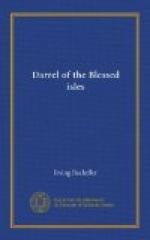Mary Allen met them at the door.
“Mother, here is my future wife,” said Trove, proudly.
Then ruddy lips of youth touched the faded cheek of the good woman.
“We shall be married in September,” said Trove, tossing his hat in the air. “We’re going to have a grand time, and mind you, mother, no more hard work for you. Where is Tige?” Tige was the young painter.
“I don’t know,” said Mary Allen. “He’s up in a tree somewhere, maybe. Come in, all of you; supper’s ready.”
While they were eating. Trove heard a sound of wheels, and went to the door. Tunk had arrived. He had a lump, the size of an apple,-on his forehead; another on his chin. As Trove approached him, he spat over a front wheel, and sat looking down sadly.
“Tunk, what’s the matter ?”
“Kicked,” said he, with growing sadness.
“A horse?” Trove inquired, with sympathy.
Tunk thought a moment.
“Couldn’t say what ’twas,” he answered presently.
“I fear,” said Trove, smiling, “that you came by the Brier Road.”
Suddenly there was a quick stir of boughs and a flash of tawny fur above them. Then the young painter landed full on the back of Tunkhannock Hosely. There was a wild yell; the horse leaped and ran, breaking through a fence and wrecking the wagon; the painter spat, and made for the woods, and was seen no more of men. Tunk had picked up an axe, and climbed a ladder that stood leaning to the roof. Trove and Allen caught the frightened horse.
“Now,” said the former, “let’s try and capture Tunk.”
“He’s taken to the roof,” said Allen.
“Where’s that air painter?” Tunk shouted, as they came near.
“Gone to the woods.”
“Heavens!” said Tunk, gloomily. “I’m all tore up; there ain’t nothin’ left o’ me—boots full o’ blood. I tell ye this country’s a leetle too wild fer me.”
He came down the ladder slowly, and sat on the step and drew off his boots. There was no blood in them. Trove helped him remove his coat; all, save his imagination, was unharmed.
“Wal,” said he, thoughtfully, “that’s what ye git fer doin’ suthin’ ye hadn’t ought to. I ain’t goin’ t’ take no more chances.”
XXXVII
The Return of Santa Claus
Did ye hear the cock crow? By the beard of my father, I’d forgotten you and myself and everything but the story. It’s near morning, and I’ve a weary tongue. Another log and one more pipe. Then, sir, then I’ll let you go. I’m near the end.
“Let me see—it’s a winter day in New York City, after four years. The streets are crowded. Here are men and women, but I see only the horses,—you know, sir, how I love them. They go by with heavy truck and cab, steaming, straining’, slipping in the deep snow. You hear the song of lashes, the whack of whips, and, now and then, the shout of some bedevilled voice. Horses fall, and struggle, and lie helpless, and their drivers—well, if I were to watch them long, I should be in danger of madness and hell-fire. Well, here is a big stable. A tall man has halted by its open door, and addresses the manager.




